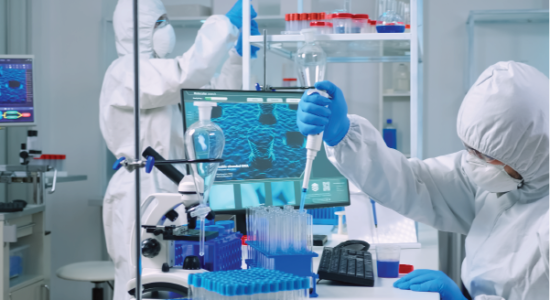iRIS ADVANCED MOLECULAR LAB
iRIS Imaging & Diagnostics Advanced Molecular Laboratory is a pioneer in the advancement of the quality of clinical laboratory testing and the molecular tools used in clinical practice in Vijayawada.
iRIS Advanced Molecular Laboratory has revolutionized the way diagnostic laboratories investigate the human, viral, and microbial genomes, their genes, and the products they encode. Our advanced molecular diagnostic tests are used for several treatment purposes in oncology, infectious diseases, clinical chemistry, and clinical genetics.
We are the physician’s top preferred Advanced Molecular Laboratory for patient-tailored interventions and therapeutics. Our tests significantly improve the accuracy and speed in the detection of microbial pathogens and analysis of a patient’s genes.

What You Can Expect At Our Advanced Molecular Laboratory?
At iRIS, we maintain a state–of–the–art advanced molecular lab led by our expert team of doctors, Ph.D. scientists in medical biotechnology, and senior technicians. Our team follows UV sterilization, proper donning and doffing areas and UV pass boxes to each procedure area which includes:
- Bio –Safety Cabinet Area
- Sample Extraction Room
- Laminar Flow Area
- Positive Sample Addition
- PCR Room
- – 80 Degree Refrigeration
- Autoclave Chambers
We adhere to stringent quality control procedures in fumigation/temperature regulation to pipette calibration.
Our molecular lab offers automated instrument systems and tools for a fast and more accurate results using polymerase chain reaction (PCR) and other molecular detection technologies for the identification and DNA/RNA measurement of infectious tumors, pathogens, and human genes.
We offer molecular tests such as:
Nucleic acid amplification tests (NAAT)
Polymerase chain reaction (PCR) assays to diagnose respiratory infections
RT-PCR test or Flu SC2 Multiplex Assay for the COVID-19 virus, influenza A and influenza B (flu).
Loop-mediated isothermal amplification (LAMP) for respiratory RNA viruses including SARS-CoV-2.
Molecular virologic assays to detect HCV RNA
Fluorescence in situ hybridization (FISH) technology to diagnose cancer, infectious, and congenital diseases
RSV, rhinoviruses and influenza A and B
Clustered, regularly interspaced short palindromic repeat (CRISPR)-based assays
COVID -19 RT PCR
Our advanced molecular methods have replaced the traditional culture-based testing for viral diagnosis aiding physicians treat infectious diseases sooner and with more precision. Our molecular tests require samples like sputum and saliva that can contain the virus. Viruses and other pathogens can also be detected in blood, fecas, and urine. The tests help your doctor to identify infections in the initial stages, prescribe the best treatment, prevent further transmission, and minimize inappropriate antibiotic prescribing.
Molecular Testing For COVID-19
For respiratory diseases including COVID-19, our molecular test samples are taken from the nose using swabs or mouth using saliva collection cups for better patient experience and comfort.
Our molecular tests for SARS-CoV-2 use the real-time reverse transcriptase quantitative polymerase chain reaction (rRT-PCR) process. The PCR test provides only quantitative information. But if you want both quantitative and qualitative information, we perform an additional quantitative (q)PCR in addition to PCR.
We analyze every aspect of the process for the most standard and accurate report in any kind of a pandemic situation. We firmly believe that global pandemics like COVID-19 is a health hazard because of its rapid transmission from person to person, leaving the organizations limping with less work force. Hence, we have a zero compromise on the cost, material quality, and turnaround time of the sample, each run loaded properly, with both the negative control and positive control. Our team closely monitors the internal control in every reaction.
We perform all our molecular tests in our laboratory because of the complexity and sensitivity of the testing process.